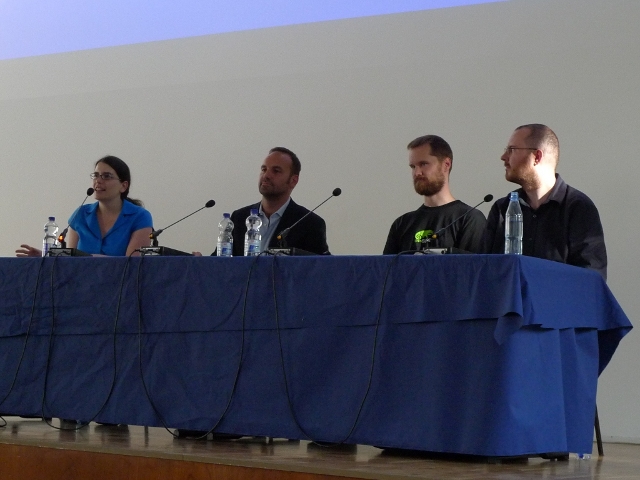Post Syndicated from Bradley M. Kuhn original http://ebb.org/bkuhn/blog/2011/08/21/desktop-summit.html
I realize nearly ten days after the end of a conference is a bit late
to blog about it. However, I needed some time to recover my usual
workflow, having attended two conferences almost
back-to-back, OSCON 2011
and Desktop Summit. (The
strain of the back-to-back conferences, BTW, made it impossible for me
to
attend Linux
Con North America 2011, although I’ll be
at Linux
Con Europe. I hope next year’s summer conference schedule is not so
tight.)
This was my first Desktop Summit, as I was unable to attend
the first one in
Grand Canaria two years ago. I must admit, while it might be a bit
controversial to say so, that I felt the conference was still like two
co-located conferences rather than one conference. I got a chance to
speak to my KDE colleagues about various things, but I ended up mostly
attending GNOME talks and therefore felt more like I was at GUADEC than
at a Desktop Summit for most of the time.
The big exception to that, however, was in fact the primary reason I
was at Desktop Summit this year: to participate in a panel discussion
with Mark Shuttleworth and Michael Meeks
(who
gave the panel a quick one-sentence summary on his blog). That was
plenary session and the room was filled with KDE and GNOME developers
alike, all of whom seemed very interested in the issue.

The panel format was slightly frustrating — primarily due to
Mark’s insistence that we all make very long open statements —
although Karen Sandler
nevertheless did a good job moderating it and framing the
discussion.
I get the impression most of the audience was already pretty well
informed about all of our positions, although I think I shocked some by
finally saying clearly in a public forum (other than identi.ca) that I
have been lobbying FSF to make copyright assignment for FSF-assigned
projects optional rather than mandatory. Nevertheless, we were cast
well into our three roles: Mark, who wants broad licensing control over
projects his company sponsors so he can control the assets (and possibly
sell them); Michael, who has faced so many troubles in the
OpenOffice.org/LibreOffice debacle that he believes inbound=outbound can
be The Only Way; and me, who believes that copyright assignment is
useful for non-profits willing to promise to do the public good to
enforce the GPL, but otherwise is a Bad Thing.
Lydia
tells me that the videos will be available eventually from Desktop
Summit, and I’ll update this blog post when they are so folks can
watch the panel. I encourage everyone concerned about the issue of
rights transfers from individual developers to entities (be they via
copyright assignment or other broad CLA means) to watch the video once
it’s available. For the
moment, Jake Edge’s LWN
article about the panel is a pretty good summary.
My favorite moment of the panel, though, was when Shuttleworth claimed
he was but a distant observer of Project Harmony. Karen, as moderator,
quickly pointed out that he was billed as Project Harmony’s originator
in the panel materials. It’s disturbing that Shuttleworth thinks he can
get away with such a claim: it’s a matter of public record,
that Amanda
Brock (Canonical, Ltd.’s General Counsel) initiated Project Harmony,
led it for most of its early drafts, and then Canonical Ltd. paid Mark
Radcliffe (a
lawyer who
represents companies that violate the GPL) to finish the drafting.
I suppose Shuttleworth’s claim is narrowly true (if misleading) since
his personal involvement as an individual was only
tangential, but his money and his staff were clearly central: even now,
it’s led by his employee, Allison Randal. If you run the company that
runs a project, it’s your project: after all, doesn’t that fit clearly
with Shuttleworth’s suppositions about why he should be entitled to be
the recipient of copyright assignments and broad CLAs in the first
place?
The rest of my time at Desktop Summit was more as an attendee than a
speaker. Since I’m not desktop or GUI developer by any means, I mostly
went to talks and learned what others had to teach. I was delighted,
however, that no less than six people came up to me and said they really
liked this blog. It’s always good to be told that something you put a
lot of volunteer work into is valuable to at least a few people, and
fortunately everyone on the Internet is famous to at least six
people. 🙂

Meanwhile, I want to thank the GNOME Foundation for sponsoring my trip to
Desktop Summit 2011, as
they did last
year for GUADEC 2010. Given my own work and background, I’m very
appreciative of a non-profit with limited resources providing travel
funding for conferences. It’s a big expense, and I’m thankful that the
GNOME Foundation has funded my trips to their annual conference.
BTW, while we await the videos from Desktop Summit, there’s some
“proof” you can see that I attended Desktop Summit, as
I appear
in the group photo, although you’ll need
to view
the hi-res version and scroll to the lower right of the image, and find
me. I’m in the second/third (depending on how you count) row back,
2-3 from the right, and two to the left
from Lydia Pintscher.
Finally, I did my best
to live dent from the
Desktop Summit 2011. That might be of interest to some as well, for
example, if you want to dig back and see what folks said in some of the
talks I attended. There was also
a two threads
after the panel that may be of interest.
